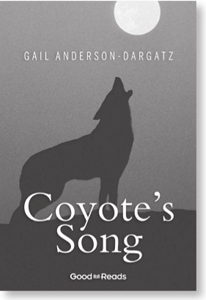Listen! (6 page)
Authors: Frances Itani

“That’s because we care about other people,” said Roma.
“There’s something else I’m glad to know,” said Liz. “The others longed for store-bought clothes the way we did. Such a small thing, but we wanted them so badly.”
“We wanted what we couldn’t have,” said Roma.
“Mam did sew beautifully. You and I had amazing clothes,” said Liz. “But we still wanted something store-bought.”
“Eve sure made us laugh, didn’t she?” said Roma.
“She’s an actor, all right,” said Liz.
“She knows how to tell a story,” said Roma. “The box on the doorstep, those terrible shoes floating down the river.”
“Speaking of boxes,” said Liz. “There’s still one more box of Mam’s things to go through. After her funeral, you and I were pretty tired. We had so many things to do. We went through Mam’s house, her closets and clothes. We cleaned floors and washed windows, got rid of furniture, gave things to charity. But one last box had been pushed under the basement stairs. I had to bring it home with me when Mam’s house was sold. That last cardboard box is in a closet in my front hall.”
“I suppose we could look at it now,” said Roma. “One box can’t hold that much. Surely it won’t take long.”
“Bring our wine into the living room,” said Liz. “We’ll open the box in there.”
Liz dragged the box from the hall closet to the living room. The two sisters kneeled on the rug. They opened the flaps of the box and looked inside.
They found old sewing material, folded in layers, along with dress patterns Roma and Liz both remembered. And spools of thread, zippers,
and old curtains. Slowly and carefully, the sisters set everything on the rug.
At the bottom of the cardboard box, they saw Mam’s old sewing basket. Liz lifted it out and raised the cover. She pulled up a tangle of thread, needles, thimbles, and buttons.
“I’ll bet some of these things were bought from the thimble man,” said Roma. “Mam kept everything. But look. There’s an envelope. What’s inside? Something lumpy?”
Liz picked up a worn envelope that lay at the bottom of the basket. She took a quick look inside and passed it to Roma. “There’s a note in here,” she said. “And something else. I think this is meant for you.”
Roma recognized their mother’s handwriting. She read out loud, to her sister:
This belongs to Roma. I should have given it to her long ago. The day the wishbone pin dropped in the river, I thought it was lost forever. I went back the next day to see if I could find the things I dropped. Everything had floated away except the wishbone pin, which was partly trapped under a rock
near shore. I must have stepped on it when I grabbed baby Liz up out of the water. The pin on the back was bent so badly, I hid the wishbone away. I didn’t have the heart to give Roma a broken present for her fifth birthday. But I couldn’t throw it out, either. I’m leaving it at the bottom of my sewing basket, where I first hid it. Maybe Roma will find her wishbone pin here some day.
Roma reached into the envelope, and there it was. A slightly crooked wishbone with faded sparkles and coloured stones. The pin on the back was badly bent.
Roma looked at Liz and they both grinned. They clicked their wine glasses.
“Mam really was full of surprises,” said Liz. “Looks like she gets the last word tonight.”
“She’s adding her story to the evening,” said Roma. “The end of a story. I can hardly believe the pin was hidden away all those years.”
“I suppose you get to make your wish now,” said Liz.
“So much time has passed. What I once wished for has changed over the years. Why don’t you make a wish, too, Liz? We could both wish for something.”
Each sister held a side of the tiny wishbone pin.
“What shall we wish for?” said Liz.
“Listen!” said Roma. “Wishes should never be told. Just close your eyes and think of what you want most. Then don’t ever tell a soul. And hope for the best.”
Many people have shared with me their experiences of deafness in families. I thank the following mothers and daughters: Frances Hill, Carrie Oliver, Jean Stratton, Christine Wilson, Emma Roszak, and Monica Gallivan. Thanks also, Christine, for lending me the original Cook’s Book, which belonged to your late mother. What a treasure—and a source for several details in my work of fiction.
For the past fifteen years, I have been reading about Deaf Culture, past and present. Of many books, I acknowledge
Deaf Parents—Hearing Children,
by Lawrence T. Bunde, and
Seeing Voices: A Journey into the World of the Deaf,
by Oliver Sacks. I am also thankful to the many people who devote themselves to listening and watching and ensuring that others will be heard.
Finally, I remember my much-loved grandmother, the late Gertrude Freeman Stoliker. Deaf for 87 of her 88 years, she was the mother of eleven hearing children. And like my fictional characters, my grandmother didn’t miss much.

Bestselling Authors with
Good Reads Books
Good Reads authors have a special talent— the ability to tell a great story, using clear language.
Good Reads can be purchased as eBooks, downloadable direct to your mobile phone, eReader or computer. Some titles are also available as audio books.
To find out more, please visit

The Good Reads project is sponsored by ABC Life Literacy Canada.


Coyote’s Song
by Gail Anderson-Dargatz
The Stalker
by Gail Anderson-Dargatz
The Break-In
by Tish Cohen
Tribb’s Troubles
by Trevor Cole
In From the Cold
by Deborah Ellis
New Year’s Eve
by Marina Endicott
Home Invasion
by Joy Fielding
The Day the Rebels Came to Town
by Robert Hough
Picture This
by Anthony Hyde
Listen!
by Frances Itani
Missing
by Frances Itani
Shipwreck
by Maureen Jennings
The Picture of Nobody
by Rabindranath Maharaj
The Hangman
by Louise Penny
Easy Money
by Gail Vaz-Oxlade
by Gail Anderson-Dargatz

Sara used to be a back-up singer in a band. She left her singing career to raise a family. She is content with being a stay-at-home mom. Then, one Saturday, Sara’s world changes.
Sara and her family go to an outdoor music festival. There, on stage, Sara sees Jim, the lead singer from her old band. He invites her to sing with him. Being on stage brings back forgotten feelings for Sara—and for Jim. And Sarah’s husband Rob sure doesn’t like what he sees.
Sara also sees something else: a coyote. Learn how Coyote, the trickster spirit, turns Sara’s life upside down.
By Tish Cohen

Marcus and Alex have two things in common—they each have a broken heart and a plan.
Marcus wants to win back his girlfriend. He is ready to stage a break-in for her. Eleven-year-old Alex wants to find his father’s killer. He has a gun and may be ready to use it.
What Marcus and Alex cross paths, they make a mess. But in a strange way, they also begin to understand each other.
The Break-In
is a funny story about finding brotherhood in dark times.
By Trevor Cole

